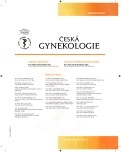-
Medical journals
- Career
Reccurent pregnancy loss – review
Authors: R. Jarošová 1,2; J. Mašata 1; D. Stejskal 2; M. Brandejská 2
Published in: Ceska Gynekol 2013; 78(2): 200-205
Overview
Objective:
Informative review of possible causes and therapy of habitual pregnancy loss and infertility.Design:
Review.Settings:
Department of Gynecology and Obstetrics, General Faculty Hospital of Charles University, Prague.Subject and method:
The repeated (habitual) loss of pregnancy is defined by three or more spontaneous abortions. Approximately 0,4 to 1% of women are affected. The pregnancy loss is more frequent in women younger than 20 and older than 35 years. The frequency of spontaneous abortions parallels the number of previous pregnancies. The causative treatment of women with recurring abortions is not available, however, it is recommended that such women are evaluated by available methods to eliminate etiological causes of repeated pregnancy losses.Conlusions:
Effective therapy is possible when the diagnostic reason for repeated abortions is determined. Nevertheless, the causes leading to repeated pregnancy losses are identified only in approximately 12% of women. However, alleged and unexplained infertility, resulting in habitual pregnancy losses has a favorable prognosis.Keywords:
reccurent pregnancy loss – age of the mother – genetic factors – antiphospholipid syndrome – inherited trombophilia – endometriosis
Sources
1. Buyalos, RP., Agarwal, SK. Endometriosis associted infertility. Curr Opin Obstet Gyn, 2000, 12, p. 377.
2. Cibula, D., Henzl, M., Živný, J. Základy gynekologické endokrinologie. Praha: Grada, 2002.
3. Deponte, A., Pournaras, S., Deligeoroglou, E. Serum IL-1beta, IL-8 and anti-heat shock 60 (Hsp60) Chlamydia trachomatis antibodies as markers of ectopic pregnancy. J Reprod Immunol, 2012, 93(2), p. 102–108.
4. Gardner, D. Textbook of assisted reproductive technologies,32rd ed. Sheepe Place, Colchester: Informa UK Ltd., 2009.
5. Hajšmanová, Z., Šlechtová, J., a kol. Průběh těhotenství při dlouhodobém podávání nízkomolukárního heparinu pro opakované těhotenské ztráty. Čes Gynek, 2008, 5, s. 278–283.
6. Hrazdírová, L., Švabik, K., Žižka, Z., et al. Should hysteroscopy be provided for patients who have undergone instrumental intrauterine intervention after delivery? Acta Obstet Gynecol Scand, 2012, 91(4), p. 514–517.
7. Hrazdírová, L., Kužel, D., Žižka, Z. Je hysteroskopie správná volba pro řešení reziduí těhotenských tkání? Čes Gynek, 2012, 77, 1, s. 35–38.
8. Kašparová, D., Fait, T. Časné těhotenské ztráty a vrozené trombofilní stavy. Čes Gynek, 2009, 74, 5, s. 360–364.
9. Madar, J., et al. Immunopathological mechanisms in recurrent miscarriage and preeclampsia. Amer J Reprod Immunol, 2001, 46, p. 96.
10. Malíčková, K., Fučíková, T. Antifosfolipidový syndrom a antifosfolipidové protilátky. Čas Lék čes, 2001, 140, 15, p. 465–468.
11. Mardešič, T. Mimotělní oplodnění. Praha: Galén, 1998.
12. Mára, M. Moderní gynekologie a porodnictví. Levret, 2002, 11.
13. Mašata, J., Jedličková, A., a kol. Infekce v gynekologii a porodnictví. Praha: Maxdorf, 2004.
14. Nussbaum, R., McInnes, R., Willard Huntington, F. Thompson and Thompson: Klinická genetika. Praha: Triton, 2004, 426 s.
15. Roztočil A. Vyšetření páru s opakovaným potrácením. Levret, Mod Gynek Porod, 2002, 11, 4.
16. Roztočil, A., a kol. Moderní porodnictví Praha: Grada Publishing, 2008.
17. Salmon, JE. Are heparins effective in some patiens with recurrent pregnancy because they inhibit complement activation?J Thromb Haemost, 2005, 3, p. 783–784.
18. Stejskal, D., et al. Plodnost a reprodukční rizika starších žen v ČSR. Čes Gynek, 1989, 54, 3, s. 161–167.
19. Šulová, L., Fait, T., a kol. Výchova k sexuálně reprodukčnímu zdraví. Maxdorf, 2011.
20. Tulppala, M., Stenman, UH., Cacciatore, B., Ylikorkala, O. Polycystic ovaries and levels of gonadotropins and androgens in recurrent miscarriage: prospective study in 50 women. Br J Obstet Gynecol, 1993, 100, p. 348–352.
21. Ulčová-Gallová, Z. Neplodnost – Útok imunity. Praha: Grada Publishing, 2006.
22. Wilcox, AJ., et al. Incidence of early loss of pregnancy. N Engl J Med, 1988, 319, p. 189–194.
Labels
Paediatric gynaecology Gynaecology and obstetrics Reproduction medicine
Article was published inCzech Gynaecology

2013 Issue 2-
All articles in this issue
- Selective progesterone receptor modulators and their therapeutical use
- L-arginin in prevention and treatment of pre-eclampsia
- Systemic enzyme therapy in the treatment of recurrent vulvovaginal candidiasis
- Evaluation of p16 protein in the managementof cervical dysplasia
- Reccurent pregnancy loss – review
- Guideline for prevention of RhD alloimmunizationin RhD negative women
- Pregnancy and multiple sclerosis –outcomes analysis 2003–2011
- Hyperlipidaemia in pregnancy
-
Psychosocial climate in maternity hospitals from the perspective of parturients I.
Results from a national survey on perinatal care satisfactionusing a representative sample of 1195 Czech parturients -
Cancer stem cells and ovarian cancer
Characteristics, importance and potential applicationsin clinical practice - Retroperitoneal lymphangioleiomyomatosis – a case reports
- Transfusion-related acute lung injury (TRALI) – review
- Blockade of calcium channels – a perspectiveof male contraception?
- Atlas of gametes and embryos of several animals and human
- Czech Gynaecology
- Journal archive
- Current issue
- Online only
- About the journal
Most read in this issue- Transfusion-related acute lung injury (TRALI) – review
- Reccurent pregnancy loss – review
- Evaluation of p16 protein in the managementof cervical dysplasia
- Hyperlipidaemia in pregnancy
Login#ADS_BOTTOM_SCRIPTS#Forgotten passwordEnter the email address that you registered with. We will send you instructions on how to set a new password.
- Career

